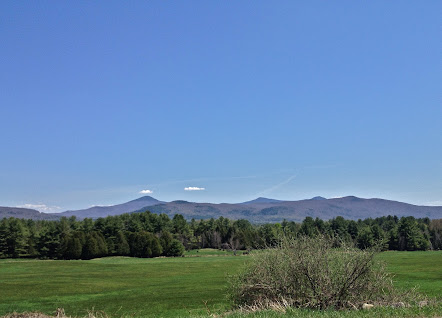June 30.
Haying has commenced.
I see the farmers in distant fields cocking their hay now at six o'clock. The day has been so oppressively warm that some workmen have lain by at noon, and the haymakers are mowing now in the early twilight.
Haying has commenced.
I see the farmers in distant fields cocking their hay now at six o'clock. The day has been so oppressively warm that some workmen have lain by at noon, and the haymakers are mowing now in the early twilight.
After hoeing in a dusty garden all this warm afternoon, - so warm that the baker says he never knew the like and expects to find his horses dead in the stable when he gets home, - it is very grateful to wend one's way at evening to some pure and cool stream and bathe therein.
The blue flag (Iris versicolor) enlivens the meadow.
The lark sings a note which belongs to a New England summer evening.
The blue flag (Iris versicolor) enlivens the meadow.
The lark sings a note which belongs to a New England summer evening.
The cuckoo is faintly heard from a neighboring grove.
Though so late, I hear the summer hum of a bee in the grass, as I am on my way to the river behind Hubbard's.
Though so late, I hear the summer hum of a bee in the grass, as I am on my way to the river behind Hubbard's.
Now that it is beginning to be dark as I am crossing a pasture, I hear a happy, shrill cricket-like little lay from a sparrow either in the grass or else on that distant tree.
The tree-primrose, which was so abundant in one field last Saturday, is now all gone. The cattle on Bear Garden Hill, seen through the twilight, look monstrously large.
The blue flag (Iris versicolor) enlivens the meadow. See June 30, 1852 ("Is not this period more than any distinguished for flowers, when roses, swamp-pinks, morning-glories, arethusas, pogonias, orchises, blue flags, epilobiums, mountain laurel, and white lilies are all in blossom at once?"); June 14, 1853 ("The blue flag (Iris versicolor) grows in this pure water, rising from the stony bottom all around the shores, and is very beautiful, — not too high-colored, — especially its reflections in the water. There was something [in] its bluish blade which harmonized with the greenish water.. . .. Instead of the white lily, which requires mud, or the sweet flag, here grows the blue flag in the water, thinly about the shore. The color of the flower harmonizes singularly with the water. . . .Large devil's-needles are buzzing back and forth. They skim along the edge of the blue flags, apparently quite round this cove or further, like hen-harriers beating the bush for game. And now comes a hummingbird humming from the woods and alights on the blossom of a blue flag. ")
The lark sings a note which belongs to a New England summer evening. See July 16, 1851 ("The lark sings in the meadow; the very essence of the afternoon is in his strain. This is a New England sound")







